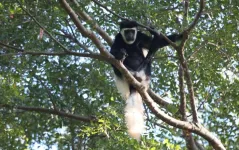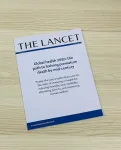(Press-News.org) Two thirds of Key Biodiversity Areas (KBAs) in tropical forests are experiencing new temperature conditions as our climate changes, research shows.
KBAs identify the most important places on Earth for species and their habitats.
The new study – by Exeter, Manchester Metropolitan and Cambridge universities – assessed 30 years of temperature conditions below the forest canopy in KBAs in tropical forests worldwide.
It found that 66% of KBAs in tropical forests have recently transitioned to new “temperature regimes” (more than 40% of temperature measurements being outside the range previously recorded there).
The remaining 34% are not yet seeing new temperature regimes – and the researchers suggest these places may be vital refuges for biodiversity.
The paper is published ahead of the United Nations Biodiversity Conference (COP16) in Colombia, which begins on October 21.
“Beneath the canopy of tropical forests, a wealth of biodiversity exists in a very stable climate,” said Dr Brittany Trew, from the Environment and Sustainability Institute on Exeter’s Penryn Campus in Cornwall.
“As such, species there are at particularly high risk from new annual temperature regimes because they have evolved under a narrow range of conditions. They may only be able to tolerate a small margin of warming above what they’re used to.”
The Post-2020 Global Biodiversity Framework includes a draft target that at least 30% of land area globally is conserved by 2030 – and specifically identifies KBAs as a core priority for this.
Dr Alexander Lees, Reader in Biodiversity at Manchester Metropolitan University, said: “The amount of political and economic capital dedicated to safeguarding biodiversity is woefully inadequate.
“Our findings show that the painful process of conservation triage – selecting new protected areas – must therefore consider the impact of ongoing climate changes on those sites in prioritisation assessments.”
KBAs do not automatically receive formal protection – this is decided by national governments in the areas identified.
The paper highlights that – of the 34% of tropical forest KBAs not seeing new temperature regimes – more than half are not currently protected.
“We need ‘climate-smart’ policies that protect these vital refuges,” Dr Trew said.
The researchers used temperature measurements, satellite data and a microclimate model to assess near-ground hourly temperatures across the world’s tropical KBAs.
The proportion of KBAs in Africa and Latin America with new temperature regimes was particularly high (72% and 59%), while fewer KBAs across Asia and Oceania shifted to new temperatures (49%).
Some KBAs across Latin America (2.9%) – and a small number in Asia and Oceania (0.4%) – have recently transitioned to almost entirely new temperature regimes (more than 80% of temperature measurements outside the previous range.
In Latin America, these KBAs were all located in Ecuador, Colombia, Venezuela or Panama, with the tropical Andes particularly affected.
The paper, published in the journal Conservation Letters, is entitled: “Identifying climate-smart tropical Key Biodiversity Areas for protection in response to widespread temperature novelty.”
END
New temperatures in two thirds of key tropical forest
2024-10-15
ELSE PRESS RELEASES FROM THIS DATE:
Fearful memories of others seen in mouse brain
2024-10-15
NEW YORK, NY — How do we distinguish threat from safety? It’s a question important not just in our daily lives, but for human disorders linked with fear of others, such as social anxiety or post-traumatic stress disorder (PTSD). The microscope image accompanying this press release, from the laboratory of Steven A. Siegelbaum, PhD, at Columbia’s Zuckerman Institute, displays a powerful technique scientists used to help us find an answer.
The scientists were investigating the hippocampus, a brain area that plays a key role in memory in humans and mice. Specifically, they focused on the CA2 region, which is ...
Rangers lead ground-breaking effort to monitor Uganda's lion population in critical stronghold
2024-10-15
In a new study published in Nature Communications Biology, wildlife rangers from the Uganda Wildlife Authority have demonstrated their ability to generate precise and reliable data on lion populations in Uganda’s Nile Delta, a critical stronghold for African lions.
The study reveals that wildlife rangers, a critical component of global conservation efforts but often underutilised in scientific research, can play a pivotal role in the conservation science surrounding the world’s most beloved big cat.
Rangers are effective at monitoring lions and are an underutilised resource
The study showed rangers ...
Modern mass extinction in an Ecuadorean cloud forest found to be a mirage
2024-10-15
One of the most notorious mass extinction events in modern times occurred on a hilltop in coastal Ecuador in the 1980s. Ninety species of plants known from nowhere else on Earth—many of them new to science and not yet given a name—went extinct when the last cloud forests of the Centinela range were cleared for agriculture. The cautionary tale of Centinela has long been a driving force in the fight to save the world’s rainforests. But did it really happen?
In a new study published in Nature Plants, an international team of botanists reveals that, indeed, it did not happen. The researchers – who spent years of scouring natural history museums, biodiversity databases, ...
HLA-DRB1*01:03 and severe ulcerative colitis
2024-10-15
About The Study: Among individuals with ulcerative colitis, the allele HLA-DRB1*01:03 was associated with severe ulcerative colitis requiring major operation, hospitalization, and systemic corticosteroid use compared with less severe disease. HLA-DRB1*01:03 has previously been linked to ulcerative colitis incidence. This study supports earlier, targeted genetic studies comparing patients with healthy controls reporting an association with total disease and severe disease requiring colectomy.
Corresponding Author: To contact the corresponding author, Marie Vibeke Vestergaard, MSc, email marievv@dcm.aau.dk.
To access the embargoed study: Visit our ...
Quantum leap in suicide prevention: Professor Philippe Courtet's visionary approach unveiled in Genomic Press Interview
2024-10-15
Montpellier, France – 15 October 2024. In a captivating Genomic Press Interview published on October 15, 2024, in the peer-reviewed journal Genomic Psychiatry (Genomic Press), Professor Philippe Courtet shares groundbreaking perspectives on suicide prevention and mental health care. As an influential PU-PH (Professeur des Universités-Praticien Hospitalier), he is a Professor of Psychiatry at the University of Montpellier, France, and head of emergency psychiatry at the University Hospital of, Professor Courtet stands at the forefront of ...
Need for streamlined miscarriage care in Canada
2024-10-15
Miscarriage, or early pregnancy loss, can have devastating emotional effects, but it is poorly managed in Canada. A review published in CMAJ (Canadian Medical Association Journal) https://www.cmaj.ca/lookup/doi/10.1503/cmaj.231489 provides guidance to physicians on how to diagnose and manage this condition and calls for referral to outpatient early pregnancy assessment clinics (EPACs) as well as a compassionate approach.
October 15 is Pregnancy and Infant Loss Remembrance Day.
Data suggest that 15%–20% of all confirmed pregnancies result in miscarriage, with ...
Traces of ancient immigration patterns to Japan found in 2000-year-old genome
2024-10-15
A joint research group led by Jonghyun Kim and Jun Ohashi of the University of Tokyo has demonstrated that the majority of immigration to the Japanese Archipelago in the Yayoi and Kofun periods (between 3000 BCE and 538 CE) came from the Korean Peninsula. The researchers analyzed the complete genome of a “Yayoi” individual and found that, among the non-Japanese populations, the results bore the most similarity to Korean populations. Although it is widely accepted that modern Japanese populations have a dual ancestry, the discovery provides insight into the details of immigration patterns to the ...
Countries that choose to do so can reduce premature death by half, researchers say
2024-10-14
DURHAM, N.C. -- Since 1970, 37 countries have cut the probability of their citizens dying before they reach age 70 in half, a milestone that signals the remarkable progress many countries have made in preventing and treating disease. But a new report argues that this goal isn’t out of reach for any country that chooses to cut its premature mortality, even those afflicted by war or poverty.
The report, published Oct. 14 by The Lancet Commission on Investing in Health, lays out a roadmap for every nation that chooses to do so to cut ...
50 by 50—How can we reduce the probability of dying before age 70 by 50% globally by 2050?
2024-10-14
A team of 50 leading international experts, the Lancet Commission on Investing in Health (CIH), explored this question, resulting in clear, actionable, and achievable measures for achieving this ambitious goal worldwide. Six of the 50 commission members are affiliated with the Bergen Centre for Ethics and Priority Setting in Health (BCEPS), a Norwegian Centre of Excellence based at the University of Bergen, Norway, including BCEPS Director and Professor Ole Frithjof Norheim, BCEPS PhD Research Fellow Sarah Bolongaita, and BCEPS-affiliated researchers Angela Chang (University ...
Research explains why some cyclists don’t wear helmets and what might convince them to wear one
2024-10-14
Copenhagen, Denmark: Wearing a helmet can prevent brain injury and deaths in cyclists, yet many do not wear a helmet. New research presented at the European Emergency Medicine Congress today (Tuesday) suggests that this is largely due to issues of convenience and comfort. [1]
The study also suggests that more adult cyclists would wear helmets if they were encouraged and incentivised to do so, for example if they were provided with a free helmet, education, and periodic reminders.
The research was presented by Dr Steven Friedman, an emergency doctor at Toronto General Hospital and associate professor at the University ...









